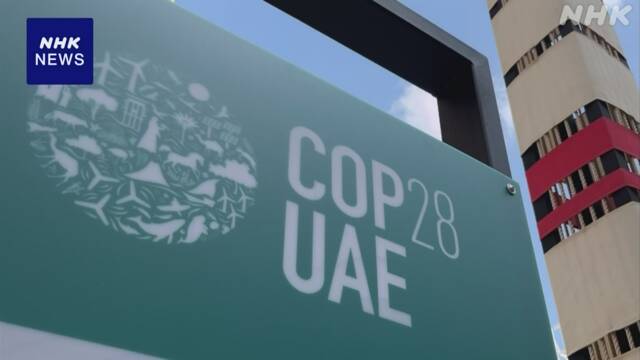COP28, the United Nations conference on climate change measures held in Dubai, UAE = United Arab Emirates, will begin a ministerial-level meeting on the 8th. Negotiations will be held for the Global Stocktake, which will evaluate the progress of measures taken globally, and will focus on how to incorporate language on fossil fuel reduction into the agreement to strengthen countermeasures.
At COP30, which began on the 28th of last month, more than 2030 countries pledged to triple the world's renewable energy generation capacity by 3.
However, while there are voices that the use of fossil fuels should be agreed on phasing out, there are also opinions that oppose it, highlighting the gap between opinions among countries.
At the ministerial-level meeting starting on August 110, negotiations will be held on the Global Stocktake, which evaluates the progress of global efforts to combat climate change once every five years, and discussions will be held on strengthening countermeasures.
Among them, the focus will be on whether words such as "phasing out" will be included in the agreement regarding fossil fuels, or whether they will not be mentioned.
From Japan, Minister of the Environment Ito is scheduled to attend the meeting on the second day.
Using the "dung" of Omi beef as energy
At the COP28 venue, seminars and other events are held to disseminate the latest technologies to the world on climate change countermeasures.
At the Japan Pavilion, a seminar was held by the Japanese automotive industry on June 6.
What was announced was a technology that utilizes "cow manure" for energy.
Approximately 4000,25 cows are raised in Ryuo Town, Shiga Prefecture, which is the birthplace of Shiga Prefecture's brand beef "Omi beef" and has a thriving livestock industry.
In Ryuo Town, we are collaborating with livestock farmers and major automobile manufacturers in the town to develop the "Biomass Industry City Concept" that utilizes cow manure.
The plant, which manufactures 1,1400 cars a year, uses city gas, which is equivalent to about 1,7 ordinary households, a single day in a melting furnace that makes car parts.
In search of a gas with a lower environmental impact, we focused on the "dung" of Omi beef.
At the farm adjacent to the plant, more than <> tons of manure are produced per day, and livestock farmers provide the manure, which is mixed with methane bacteria at the factory and fermented in a tank to produce gas.
The plan is to use the biogas generated in this way at the factory.
In the town, in addition to using the residue left after extracting the gas, the crops grown in this compost are used as feed for Omi cattle and cow manure is used again, aiming for a system that circulates biomass resources in the region.
A livestock farmer who supplies cow manure to the factory said, "I think that it can play a role in reducing CO2 emissions, including the disposal of compost, which is a problem as industrial waste."
Utilization of "cow manure" in CNG vehicles
In India, which has 3 million cows in the world, a Japan automaker that sells 150.10 million CNG vehicles that run on natural gas is working to use biogas generated from cow manure as fuel for cars.
At the Japan Mobility Show held in Tokyo, a CNG vehicle that is actually running in India appeared, and a project to divert biogas generated from cow manure to this car was introduced.
In addition to gasoline, a tank filled with gas is installed in the trunk, which means that 1 cows can travel about 6 kilometers for one day.
At a power generation facility in Shizuoka Prefecture in which the automaker has a stake, the manure of about 1 cows a day is collected to generate biogas and produce electricity.
300,80 kilowatts of electricity is generated annually and used in surrounding houses, which has the effect of reducing carbon dioxide by 1150,<> tons, so we plan to utilize the knowledge gained in Japan in our business in India.
Hiroyuki Yamano of Suzuki's Corporate Planning Office said, "We are aiming for a carbon-neutral society with cars that run without using fossil fuels. I was talking.

